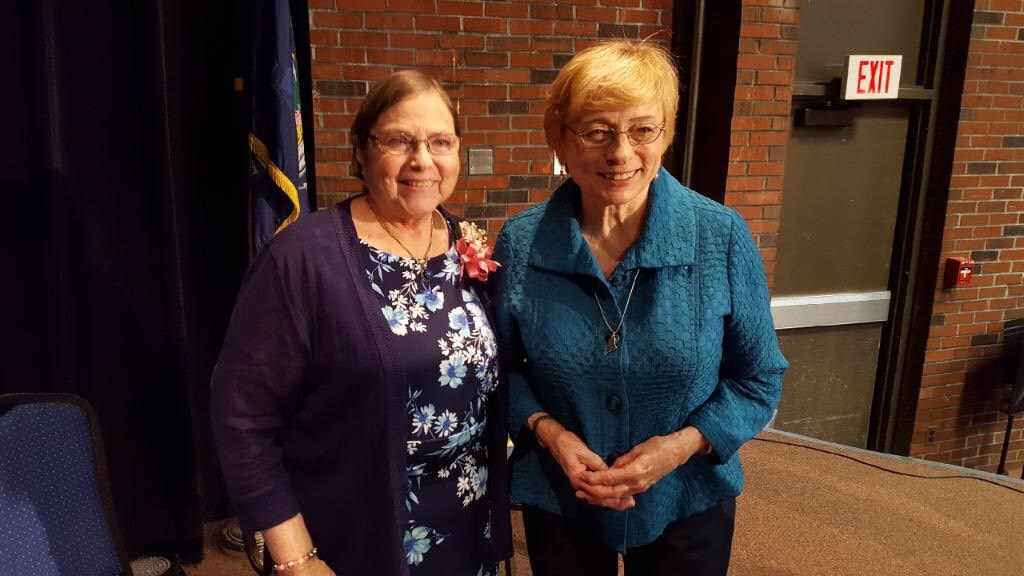
CARIBOU, Maine — Officials inducted Caribou resident Darylen Cote on Saturday, March 16, into the 2019 Maine Women’s Hall of Fame, along with Maine Gov. Janet Mills.
Kathryn Olmstead originally nominated Cote, but did not tell her until she was officially inducted.
“I didn’t even know she’d nominated me and had gathered all of these supporting letters until she called to tell me I was inducted,” Cote said. “I was really shocked, that was my first reaction. I didn’t think that I would have been able to do all the things I’ve done in my life without the help of others. Nothing I’ve ever done or accomplished has ever been done by myself; I’ve always worked with wonderful people.”
During the induction ceremony at the University of Maine at Augusta, Olmstead first mentioned several “unsolicited letters of support” for Cote following her nomination, with one from as far away as Colorado.
“All were eager to applaud Darylen’s achievements in family planning, women’s health and equity, social justice, and education for low income students,” Olmstead said. “Support came from diverse fields, but there was a common theme.”
That theme, according to Olmstead, was bravery in the face of controversy and opposition.
“Because Darylen believes so strongly in the people and causes she champions,” Olmstead said. “She is not afraid of controversy. One supporter after another praised her ability to meet resistance with a spirit of collaboration that builds community support and results in significant social change.”
Olmstead said the words “tireless,” “advocate,” “fighter,” “pioneer,” “leader,” “role model,” “indefatigable,” “determined,” and “courage,” appeared on numerous occasions throughout the letters she received, and that many cited her work’s statewide impact.
When Olmstead asked Cote where her strength comes from, she learned that “between the ages of 5 and 10, [Cote] watched her mother succumb to breast cancer,” and was “inspired by the way her mother fought the illness.”
This led to Cote advocating for women’s health through the American Cancer Society, one of the many highlights in her career, which includes teaching English at Limestone High School, working as a community education specialist for planning at the Aroostook County Action Program, working with County schools and educators to incorporate health education and human sexuality into their curriculum, and serving as an educational services coordinator for ACAP Family Planning and Adolescent Health.
Following a quarter of a century with ACAP, Cote began to work for the statewide Maine Family Planning organization. In 2004, she joined the University of Maine at Presque Isle as director of its TRIO College Access Services program, which assists economically disadvantaged County students who may be the first in their family to attend college.
“She looked to Eleanor Roosevelt, Maya Angelou and Gloria Steinham as role models for her cutting-edge advocacy,” Olmstead said. “Closer to home, she felt the grounding, mothering influence of older women in her [American Association of University Women] book group in Caribou.”
On March 19, Cote said her mother’s battle with breast cancer was a significant motivating factor throughout her career, and that her first opportunity to teach others about breast cancer and health is something that spoke to her “on a really deep level.”
“I come from a family of educators,” she said, “so women’s health and teaching combined two of my passions.”
For anyone seeking to make a similar impact in their community, Cote said it is critically important to make a lifelong commitment to learning, reading, and studying.
“Education and women’s health are constantly evolving,” she said. “We are always learning new things about the brain, and medicine, and there are always new developments on the horizon.”
Cote said that despite progress in women’s health, affordable education, and fair pay, “we’ve also had some steps backward.”
“I would encourage all women and men to educate themselves on the issues,” she said. “Be active, because we take those steps backward when we allow a small minority of people to make the rules. When we speak up and say what’s true for us, like with the ‘Me Too’ movement, that’s when change happens. We can’t go backward, and we can’t lose what we’ve gained. I’m afraid there will be some instances where that could happen unless we continue to take action by writing letters, donating our time or money, and making our voices heard.”







